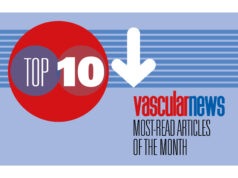 The Society for Vascular Surgery’s Patient Safety Organization (SVS PSO) has launched a national smoking cessation initiative. It includes tools and resources to help physicians, surgeons and other healthcare professionals to help their patients kick the smoking habit.
The Society for Vascular Surgery’s Patient Safety Organization (SVS PSO) has launched a national smoking cessation initiative. It includes tools and resources to help physicians, surgeons and other healthcare professionals to help their patients kick the smoking habit.
CAN-DO (Choosing Against combustible Nicotine Despite Obstacles) includes three components to increase smoking quit rates: physician and patient toolkits; inclusion of smoking cessation variables in the SVS PSO Vascular Quality Initiative’s arterial registries; and updating smoking cessation information on the SVS website (vascular.org), which is completed.
“Getting our patients to quit smoking is probably the most important thing we can do, probably even more than any surgery we would talk about,” said Matthew Edwards, a vascular surgeon with Wake Forest University School of Medicine (Winston-Salem, USA).
A press release details toolkit elements that physicians and surgeons will find useful, including a quick guide to treatment options, information on counselling via text messaging, use of smartphone apps and web-based services, a dictionary of electronic cigarettes and vaping products, resource documents, patient-facing information doctors can distribute and billable smoking cessation codes that will permit reimbursement.
The Patient Toolkit, meanwhile, includes links to many resources on quitting smoking.
Simply asking a patient, “Do you smoke?” is insufficient, said SVS PSO associate medical director Gary Lemmon, urging surgeons and doctors to extend the conversation to the “3 A’s:”
The Ask: Ask if the patient wants to quit and when the patient smokes that first cigarette of the day.
The Assist: Offer liberal use of nicotine replacement therapy and medications but tell the patient not to use e-cigarettes as a crutch while also smoking.
The Advice: Refer patients to professional counselling, apps and other tools.
This targeted intervention is proven to improve success in smoking cessation, Lemmon said.
“Smoking is the leading cause of preventable death and disability, 10 times more than the premature deaths from all wars fought by the USA,” said Lemmon. It is a major cause of cardiovascular disease and more than 90% of cancer of the lungs and other organs. Moreover, secondhand smoke increases the risk of death and disability to those who do not smoke, he said.
Both SVS and the American Heart Association advise patients to quit smoking before surgery.
Lemmon and SVS PSO director of Quality Betsy Wymer noted that new technologies have multiplied the number of tools available to help people quit. “Most adults try to quit six times before being successful,” said Wymer. She and Lemmon urged surgeons to stress, “It is never too late to quit.”
Learn more at www.vqi.org/smoking-cessation/.













